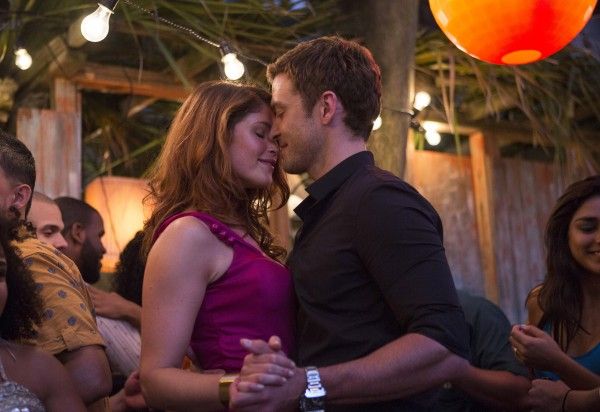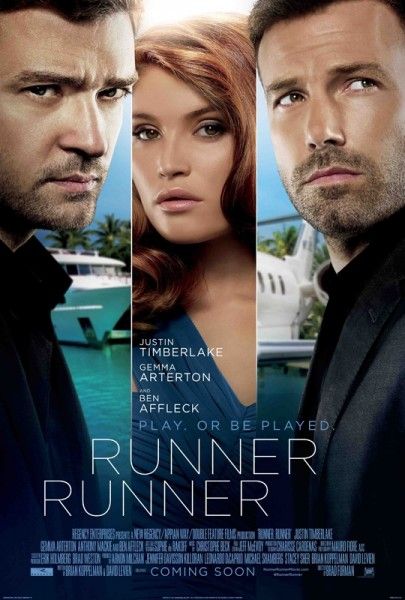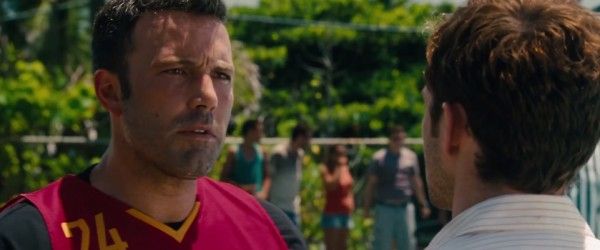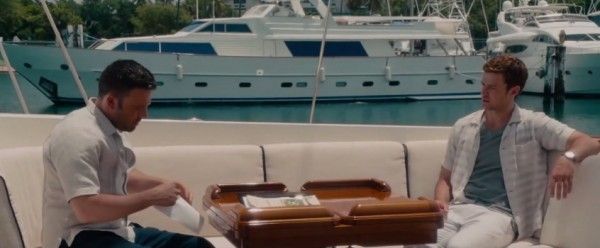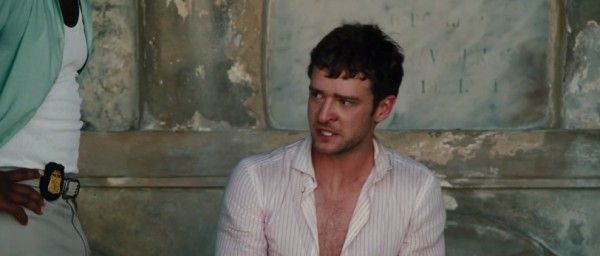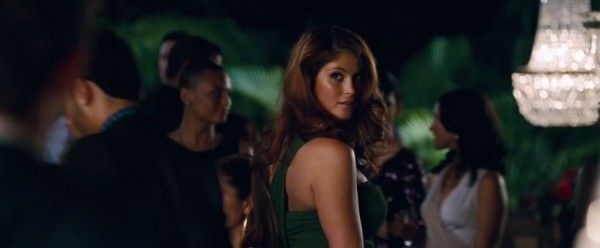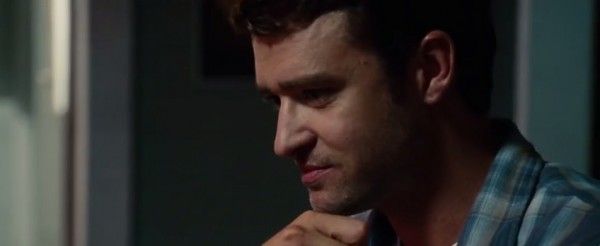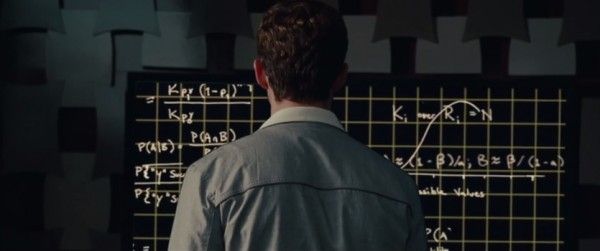On a hot and humid evening last August, I spent the night on the San Juan, Puerto Rico set of director Brad Furman‘s (The Lincoln Lawyer) crime thriller Runner, Runner. The film stars Justin Timberlake as a Princeton student who is cheated out of his tuition money playing online poker and ends up traveling to Costa Rica to confront the on-line mastermind (Ben Affleck). The film also stars Gemma Arterton, Ben Schwartz, Dayo Okeniyi and Oliver Cooper and it was written by Brian Koppelman and David Levien (Rounders). For more on the film, watch the trailer.
During a break in filming, I got to participate in a group interview with Brad Furman. He talked about casting Affleck and Timberlake, what he knows about offshore gambling, how The Lincoln Lawyer opened up new doors in his career, filming in Puerto Rico, and a lot more. Hit the jump for the interview. Runner, Runner opens October 4th.
Question: You are shooting on film. Everyone is doing digital now. Why did you decide to go with film?
BRAD FURMAN: Well, for me, it is black and white. The opportunity to shoot and get the depth out of the film - that I don’t think you can get out of digital - is a huge deal for me. I love the opportunity to shoot digital because you can shoot so many takes, it’s really malleable, it’s a ton of fun, and it is easy. I had an opportunity to shoot Lincoln Lawyer on the RED, but I shot my first film on Super 16. So I am a loyalist and I really absolutely love film. I think you can extract so much more. We shot the cemetery - I don’t know if you saw it over there on your way in – and it is all of this white marble and stone. We shot this massive wide shot and on digital you would have never been able to read the texture and the tonalities. So film is really important. Also, I really wanted to create a classic aesthetic. I thought very, very strongly that in an effort to do that and create a piece that would hopefully be timeless; film was a crucial piece of my decision in doing that.
Can you talk about the casting of Ben Affleck and Justin Timberlake?
FURMAN: I have been on the movie before anyone, which is rare. On my last movie, Matthew McConaughey was on it first. In this particular instance, a handful of people suggested Justin at the time. At the time, the movie was written for a bit younger character and we would have to age it up to do it with somebody like Justin. I actually thought it was a great decision as far as character because it gave the film gravitas and it made it more intriguing, gave it depth, it gave it layers with an older character, and made it more substantive. Then the matter was just sitting down with Justin and just really talking to him. So we sat down and we really met eye to eye. We saw eye to eye as far as the vision of the film creatively, as far as the type of movie star that he is and wants to become, the sort of vérité version of this movie, and sort of dropping a guy with the sort of persona of a Justin Timberlake into the world like a La Perla, which we sit in today, and it was all of these elements. The thing was is that he is charismatic and he is intelligent. He is actually, in my mind, the embodiment of a classic movie star. So as a result of that, I felt really confident that we could take this journey together.
And then we were very blessed because the windfall of one actor leads to another. We got Justin and that lead us to Ben Affleck. I had a chance to sit with Ben when he was finishing up Argo and it was great for me and for the film really because Ben has been incredibly selective about himself as an actor and a filmmaker. He is now as a filmmaker really carving out roles for him as an actor. So if he is going to work with a particular filmmaker, I take that as a high compliment. I love The Town and I love his work. So we sat down and we were very amenable in seeing the same vision. Not comparing myself, but I think we sort of approach filmmaking from a bit of a 70s aesthetic. In sort of having that unified vision I felt that not only would he come as an actor, but he would help elevate the perspective. As would Justin and anyone else we would bring. So it was great.
And he understands poker.
FURMAN: Yeah! He loves poker. I didn’t know that about Ben. A lot of people are more into celebrity’s lives. I knew him as an actor, filmmaker, and writer. The fact that he is into the gambling world, I think, was a bit of a lure that got him interested and then hopefully I, the writers, the producers, and everything else became the hook.
What do you know about illegal, online, offshore gambling? What is the big deal? Who gives a shit? What is it?
FURMAN: I think the “what is it” is the world. It is a world in filmmaking that we haven’t seen. I’m not somebody who is big into the world of gambling. This is, to me, great stories or great characters – that is what makes great movies. But the world of online gambling is a world that we have not seen on film. I was very excited to bring that amongst some new elements of the world that we are bringing to this movie, which I think are really interesting. There is sort of my version also of the Electric Daisy Carnival. There are things like that that are international things that are not just sort of so insular. That is the fun part of filmmaking – showing people of all different types and walks of life things that they haven’t seen.
The attraction I understand. What I am really asking is a personal question: what is online gambling and why is it such a big deal? As a film, I understand, it is fantastic. But what is it? Does somebody play poker on the internet or…?
FURMAN: With the development of the web everything is instantaneous. Everything is about how quick you can get it. So with online gambling you don’t have to travel to Vegas, Atlantic City, or anywhere in the world to gamble. You press a button in your home and you gamble, you make money, and you lose money.
But what is the problem and concern? Does the IRS want the money? Why is it illegal? Is it untraceable? Is there a big mafia behind it?
FURMAN: The U.S. government controls the online gambling because the way the funds are routed are wired. So they are doing offshore gambling and it is not able to be monitored by the government. So it causes a bit of illegality, and quite a potential minor one. [laughs] But it is dealt in a fun way in our film and it sets up the premise.
Can you talk about working with a DP like Mauro Fiore in a place that is as photogenic as this?
FURMAN: My best friend and cinematographer is a guy named Lukas Ettlin and we worked together for years. I am always striving to be the best that I can be as a filmmaker. So when the opportunity came across my table to collaborate with Mauro it was very, very exciting. I love Training Day, and Lukas and I both referenced Training Day in our early work. Obviously, everyone knows Mauro from winning the Academy Award for Avatar. I just thought that it was an opportunity to learn. So Lukas and I discussed it, and I knew it was something that the studio was a big advocate for. They felt that this was a big opportunity for me. For me, I felt like I was going for a walk and it was just another day. But the reality was that Mauro and I met and we talked. We talked about Italy, life, filmmaking, we went to my house, we watched his old movies, we watched new movies, and we watched a ton of stuff. I just felt that he would be a great partner, a great mentor, and a great guy to learn from. And I felt that he could learn from me too because there is a vantage point of being a young filmmaker and having this sort of aggressive hunger approach, and then working with a guy who just came off a movie like Avatar.
I think I have been a constant reminder to Mauro about being a guerilla filmmaker and coming into places like La Perla. This is taking him back to his days of Training Day or his days at film school in Chicago and things like that. We have been a great unified team. We have had a ton of fun I’m very proud to work with him. He has elevated the film and he has elevated me as a filmmaker, and I hope I have done the same for him. I can’t say enough nice things. He is a real talent and the crew that he brought is absolutely tremendous and hard working. We are very blessed to have him and everybody that he has brought to the table.
You mentioned the 70s aesthetic that you and Ben have in common. Are there any touchstones that you sort of pointed to specifically when you went into this movie?
FURMAN: I think it is more of just… I’m more of a substance over style kind of guy. But I believe that style should elevate substance. If you look at movies like Serpico or Dog Day Afternoon and that sort of American classic cinema from that period of time, which I think was our best cinema at the time, there is no question that Ben referenced that in all of his work. You will see it recently in Argo, which I am very blessed to have had the opportunity to have it screened for me and it is terrific and wonderful. You know, All the Presidents Men and movies like that – I began to reference those films. There is a bit of that in The Lincoln Lawyer and there is a bit of that in my first film, The Take. So we just sort of approach from the same manner and same way, and I think that he appreciated that. He also really loved my film, The Lincoln Lawyer. I was very blessed and appreciative.
How did the success of The Lincoln Lawyer open the door in terms of picking projects, taking meetings? What did that do for you when it came to picking another project?
FURMAN: Well, I think there are a lot of different ways to looking at it and how to build a film career and the specificity of your choices. For me, I am not interested in simply working as a director. If I am not making movies that I want to make, that I feel passionate about, or that I feel are hopefully at the level of cinematic quality that I feel they should be then I am not really that interested. As a preface, what attracted me to Lincoln Lawyer was that it was a dramatic character story. A lot of people told me that I would be dead in the water on it because of McConaughey. They said that he was done, which I didn’t believe to be the case and, as we have proven, that obviously isn’t the case. That movie went beyond… people said that you couldn’t make a legal drama or thriller because it was TV fare, and I didn’t agree with those things. So I went and made the movie in my heart that I believe that we can make, and we succeeded. Basically, I was super selective before then and I have been super selective since then. But, yeah, I have been seeing more doors and opportunities open.
But, for me, it is about the script. I will go to work if it is for a million bucks, but if it is a great project and if it makes sense. As I was discussing earlier, I just felt that Runner Runner was terrific because of the opportunity of getting into a new world and the different elements and layers that you are probably not familiar with that you will see in the film that we are sort of exposing people to. I got really super excited about working with Justin because I really believe in him and believe that we are going to show a side of Justin Timberlake as an actor that people haven’t seen.
What side is that?
FURMAN: I am not negating any of the success that he has had or any of the terrific work that he has had, but he is delivering a performance that, in my opinion, is riveting and it is grounded and raw. It is very similar in a way to what I tried to do with Matthew in Lincoln Lawyer. You know, just really trying to flip it. Putting Justin Timberlake in La Perla; I don’t think that is something you see every day. That is not the typical commercial, but I think it is super commercial. I think that it grounds him in a way and almost humanizes him in a way that I think is relatable and gives you an entry point. So, for me, that stuff is exciting - just peeling back the layers of the onion to make it interesting. This movie is interesting because it is a balance. It is the gritty raw stuff, but it is also the super sophisticated, intelligent, psychological complexity that Ivan Block – Ben’s character – has with Richie. So, you know, there are a lot of different layers.
For me, I like to think that this movie represents a time and a demarcation of my life and my career. I don’t think I am going to want to make another movie like this just like how I am not going to want to make another Lincoln Lawyer. But Hollywood is about taking steps and making choices – politically and creatively – and balancing both to advance your career. If this movie succeeds and does well, which I think it has even way more commercial potential than Lincoln Lawyer for a lot of reasons, then I can start making what I consider to be my movies like things that I have written, developed, things I have toyed around for years, book rights, and things like that. But that is a bit of the journey.
Can you talk about La Perla as a location? What was your awareness of it before and how it has been like working in that neighborhood?
FURMAN: It all starts with what the truth is, and once I found out what the truth is for the character, the truth is for a location. I believe locations should try to be and evoke the characters in a movie. The truth for me is Costa Rica, and what is Costa Rica? I tried to do due diligence on Costa Rica and there was a balancing issue of it being landlocked and on the water, and how to figure that out, which we did and made it realistic. It’s unfortunate, but amazingly so, that there is an incredible spirit in Costa Rica but it is also incredibly impoverished, but yet at the same time it is really beautiful. You have this class distinction that exists like the really impoverished people with the wealthy living right above. Like you will be in the ghetto and then there will be this super fancy hotel or houses built into the mountain right above it. So when I was looking at that I had to figure out how to recreate that, and the essence of that, in Puerto Rico because we were doubling.
Why did you shoot in Puerto Rico?
FURMAN: I’m a big believer of “when there is a will there is a way” but from the studio’s perspective I think it just seems like a bigger leap than you can get a sort of bureaucratic move to make. I am not pointing at anyone. I just think it’s the sophistication, the crews, and the tax break here is like 40%. So I just think that there are a lot of reasons Puerto Rico is open arms to coming here. But, sure, do I think that you can go and make a phenomenal feature in Costa Rica? Yeah. Have I convinced the studio that we are going to shoot for a week there? Yeah, we are going there for a week. So that is a big victory for this film. I am so excited about that.
Something that I am really excited about is that this is going to be rated R. So you are going to be able to actually show the ramifications of dealing with certain people, if you will. Can you talk about the freedom of having an R rating and is this guaranteed? Is the studio definitely on board with an R rating?
FURMAN: Yeah, there is no way at this point. I guess everything is possible but I wouldn’t know how to edit the movie. I mean, the language alone is an R rated movie. It is just a content thing. You know, Lincoln Lawyer was R rated and I just felt that if it wasn’t you would be bleaching out the content. I am trying to make movies that… all of these things are compromises. I mean, hopefully…you know, there are certain filmmakers who make what they want and how they want. There are probably three, maybe. And then you have this weird collaboration thing that goes on. I believe in the Auteur Theory but I believe that there has to be a singular vision and then there has to be a unified group of people behind that vision. I’ve been lucky enough to have my vision supported. Yeah, there were definitely compromises made on Lincoln Lawyer. I am proud of that film, but there is a part of me that feels like, “Yeah, I knew how to make that movie even better.” I will live with that always. That is always a tough pill to swallow. That is just me, though.
I will probably say the same thing with Runner Runner. It is just life, for better or for worse. I embrace the studio system and I embrace the support that the studio has given me. The reality is that I think I have been able to usurp the system in a way that I am getting types of movies and things done that are not typical. I mean, it is a character drama between Ben Affleck and Justin Timberlake. It is not a superhero. It is not a shoot-them-up or blow-them-up movie. So we don’t answer to all those types of questions. We are doing things within the film that are uniquely different and it is being evoked in all of these different ways.
Excluding your documentary, this is your third full length feature film. You talked about earlier about some growth that you found while doing this film. What are some things that you have learned about yourself or about filmmaking that you are going to take to your next film?
FURMAN: It’s unfortunate. What I have learned first and foremost is to follow your instincts. As a filmmaker, there are no rules as to how to play this game. That is a big problem I think that exists in the education on how to be a filmmaker or how to make movies. I think you don’t break new ground in anything in life if you are willing to just follow the rules. I think that you have to break them. That is something that I constantly learned from being an independent filmmaker and having people not believe in me and having to raise money, steal money, take money, and whatever. That is literally what we would do. We would find locations and guerilla shoot them. They told me on my first indie, “You can’t shoot these trucks late at night.” We went in, I broke into my own compound, we took the trucks, busted through the gate, and we shot all the stuff. That is how I was trained because that is what I went and did. So when I got to these bigger studio movies it is a lot about what you can’t do and if you have to bring Justin Timberlake here you have to bring 50 people. I’m like, “Why? The fucking guy is walking down the street. Just roll the camera.” There are all of these elements of these political and larger things that I think I am learning about in the bigger system. As I said before, I embrace that system and you have to learn how to make a movie in that system.
Here is the thing, you can make a dope movie and it may never see the light of day. I am crazy proud of my first movie. I had a filmmaker operator on my set that came up to me and was like, “I gotta talk to you.” I said, “Oh, okay…” and he said, “I love The Take. I love your first movie. It is so raw. John Leguizamo! I am so fascinated with it.” I have mixed emotions with both of my movies. But the bottom line was that he was like, “But I don’t really like Lincoln Lawyer. Don’t hold it against me.” And I was like, “No, man. It’s cool. I don’t like Lincoln Lawyer some days too.” The point of that story is that you just take this journey and you sort of figure it out. What you learn is a lot about how to work within the process and some of those limitations. On a technical side, every time you are making it and doing it – you are learning those things. So there is the technical side that you are growing at and there are your instincts. Every time I trust my instincts I land on my feet and every time I don’t, I go, “Why didn’t I trust my instinct?” So these are just things that I think are just human growth. It’s your perspective as a 30 year old man versus a 20 year old man. You look at your Monday morning quarterback and you’re like, “I wish I knew then what I know now.” So that is just natural evolution.

